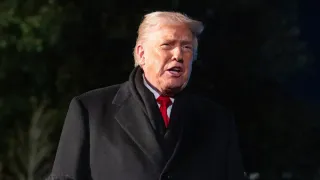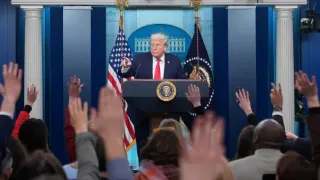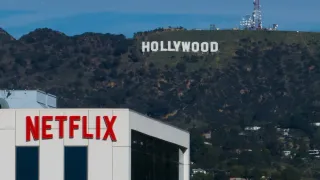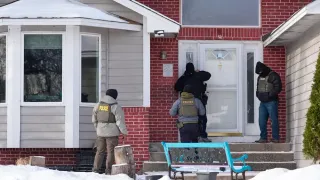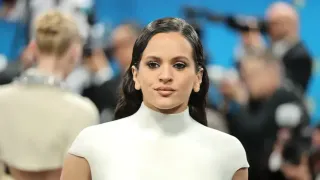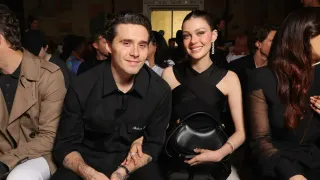March 23, 2015
Fascinating People :: Antony Hickling
Kilian Melloy READ TIME: 10 MIN.
A few weeks ago I interviewed German filmmaker and screenwriter Andr� Schneider about a short film he concocted with director Antony Hickling. That film, "One Deep Breath," was so striking in visual artistry and so brimming with poetic and dramatic meaning that it left me feeling dazzled and exhilarated. Andr� suggested I interview Hickling as a follow-up, and after Hickling sent me a link where I could view his earlier film "Little Gay Boy," I felt I had stumbled into cinematic genius of the old-school variety.
I was determined to make the interview with Andr� and the interview with Antony Hickling a matched pair, which accounts for the gap of several weeks between postings. But here, at last, is a chat with a filmmaker whose work is provocative, challenging, and exciting. Not in the hollow, over-used senses of those words (be warned on this point!) but in the raw, pulsating original meanings: Hickling's films (these two, at any rate) are movie-lover fare, the sort of work that excites film scholars and devotees of the cinematic arts alike.
Here, then, readers, is an introduction to the fascinating Antony Hickling. Be on the lookout for this man's work, because it is seismic.
EDGE: Before you made "One Deep Breath" you made "Little Gay Boy," or, to use the film's full title, "The Little Gay Boy Triptych" -- a title that resounds on many levels, because in addition to its initials spelling out LGBT, the film's title also refers to a type of religious painting in which three panels are juxtaposed to create a cumulatively reflective, religious experience.
So too, here, where we see three episodes belonging to the same overall story: In one, Maria (Amanda Dawson) is a sterile prostitute from England working the streets of Paris, to whom a sexy, foul-mouthed angel announces that she is going to have a child who will be gay, and also the son of God. Maria is then impregnated by a john.
In the second of the three episodes, we skip forward in time seventeen or eighteen years and meet Jean-Christophe (Ga�tan Vettier), the product of this union; he's not only overtly gay, but he's also harassed and bullied. Those who don't want to intimidate him want to exploit him, which is what happens when he models for a photographer. Eventually, Jean-Christophe ends up going to sex clubs, where he's seduced. There's also some creepiness at home, where Maria attempts to seduce him.
In the third act, Jean-Christophe meets his father (Manuel Blanc), with whom he has a relationship that turns out to be as incestuous, or more so, as the one he has with his mother. Jean-Christophe's fantasies are woven into the narrative of the last two acts, and include sex with one of the gods from the Hindu pantheon -- as well as an act of patricide!
Have I more or less accurately summarized the film?
Antony Hickling: Yes, Kilian, that's about it...
We begin with the Conception of the Little Gay Boy. In the second part Jean-Christophe (JC) goes on a Christ-like exploration of his sexuality; the film remains ambiguous as to whether JC intentionally looks for these experiences, or whether they are imposed on him as a form of abuse. In the third and final chapter, JC meets his father for the first time.
The film, for me, contains a very positive message: Leave that guilt, abuse, self-loathing and fear behind. It's about liberation or emancipation, which is very personal, and dare I say it, autobiographical...
EDGE: Now, to discuss the film in more specific terms -- first off, from what I have found about the triptych online, it looks like "Little Gay Boy" was filmed as three separate short films before being put together into a three-act feature. Is this correct? If so, was it always your intention that the three pieces would fit into a single presentation?
Antony Hickling: I had the idea from the beginning to make a film in three parts as a Triptych. A portrait of the mother ("The Conception"), the Son ("The Chemin de Croix"), and of the father ("The Ascension"). The original idea was that each film would have its own individual style and story, yet the three parts shown together would paint the full picture.
I didn't, however, write the three parts at once. I created the first, then worked on the second, and, a year later, the third.
As you can see from the film, painting is very important for me.
EDGE: Yes, that's true - paintings, and paint, plays a big part in the film. Well, it is a triptych, after all.
Antony Hickling: As a kid I spent a lot of time in churches and galleries, places in which to appreciate Fine Art, particularly as a non-verbal form of communication and as a form of emotional intelligence.
EDGE: I think this is a brilliant, critical look at religion in general, as well as being a rather profound meditation on Christian mythology. Can you say something about the origins and intentions of the triptych?
Antony Hickling: The origins are founded, as with a lot of Queer work, in experience. I grew up in a religious environment, and religion played an important role for me at a time when I was trying to understand and come to terms with my sexuality. The film is an artistic expression of that journey. I used my experience, my vision and my difficulties to express that. On a personal level, I think that my desires at that age were ambiguous. I was growing, learning to try to come to terms with something the outside world was telling me was wrong. Or at least, I ended up telling myself it was wrong, thanks to social construction and religious nonsense.
I likewise wanted to manifest artistically the university research I'd been doing on Queer, my interpretation of it anyway. I wanted to involve the queer community and work with artists, actors, dancers & performers.
The intention was to create a sort of personal mythology, yet, at the same time, make a social comment on religious institutions and normative forms through art. The Vishnu character makes reference to my Indian father whom I met for the first time five years ago. Hence the third part, "Holy Thursday (The Last Supper)."
EDGE: There is a rich tradition in cinema of looking at religion in a skeptical way, or in a way that goes beyond unthinking piety -- sometimes to point out the absurdities of faith systems, but also, sometimes, to suggest deeper spiritual meanings. Did you have a particular goal in mind for how you want the viewer to look at faith after seeing your film?
Antony Hickling: The film is an explosion of thoughts and ideas. I'm not trying to impose a way of seeing things, but hope the film is challenging and thought provoking.
I felt free to work on the subject using what I needed from my personal palette to tell the story.
Trying to incite confidence, self-worth and strength in order to escape religious doctrines is part of the message for me. "Take a sword. A bow and arrow and a sword..." (The song from the film)
EDGE: A film like this would incite huge affront and anger in America. Has there been an outcry over it in Europe? If so, to what degree did you anticipate, or even welcome, such an outcry?
Antony Hickling: I'm always a little nervous before showing the piece depending where I am and who the audience are. A straight public, or a predominantly LGBTQ public... Depending on the type of audience the reactions obviously change. The Religious aspect was an issue in certain countries, the body art and the sexually explicit material, an issue with other crowds. It really depends.
Things change as well depending on the political and social situation within a particular country. What their position is with Gay rights, for example, changes things.
I was surprised by certain reactions -- for example, in Romania, where I was worried about homophobic or religious outcry or in Belgrade where the festival building was circled by police. However the film was received with curiosity and open minds. Quite the contrary to what I had expected.
In one festival in Paris, the film was shown to an audience who didn't quite realize what they were about to see. There were a few shocked faces there!
Bruce LaBruce came to see the film in Bliboa, Spain and told me that if certain people didn't leave the room during one of his screenings, then he starts to worry about the work...
The CNC in Paris (the film board) classified the film "deeply shocking for a young public," and gave the film an 18 years certificate. I found that quite cool.
The piece should shake you up a bit. That means that it's working. I don't think it's the sort of film you remain indifferent to. You either love it or you hate it.
EDGE: When it came to casting, tell me this: Did you have more concern from potential cast members over the sexual content of the film, or over the religious content?
Antony Hickling: It was most definitely the sexual content. I was more concerned for Ga�tan than for anyone else. As a young actor, I wondered whether the film would be possible for him. I asked him to read the script and think it over -- talk with his teachers, parents etc. etc.... I wanted him to be sure.
At one point I thought about asking a porn actor to play the role, purely because of the film's explicit nature. However it was important to work with a professional actor, and I am glad that Ga�tan jumped into the project with such enthusiasm. A non-professional would not have the technique necessary to execute such a task.
I think the religious nature of the project isn't really taboo for anyone that I know... ;-)
EDGE: I had the pleasure of chatting with your collaborator Andr� Schneider a few weeks ago. We discussed your film "One Deep Breath." It seems to me that there are certain thematic connections between "Little Gay Boy" and "One Deep Breath," even though they are very different stories using quite different techniques. And yet there are also striking similarities -- for example, the presentation of what a character is thinking or fantasizing, as though those fantasies were really happening -- accepting them as real on some level, and presenting them as such. Do you feel that "One Deep Breath" is a closer look at some of the concerns you raise in "Little Gay Boy," or perhaps "One Deep Breath" is a continuation of how you explore certain ways of thinking and filming?
Antony Hickling: I took "One Deep Breath" as a completely new project, and didn't in any way think about links in themes or style. I accepted the film because the subject matter is powerful. However with "One Deep Breath," I took the opportunity to experiment. A chance to try out new things.
The idea of adapting Andr�'s original script and making it my own was exciting, challenging and rewarding.
I am not sure that "One Deep Breath" is a closer look at some of my concerns but more about conveying the truth of the central character, Ma�l [played by Manuel Blanc], who has just lost his partner to suicide. I tried to do this in a non-conventional way using a non-linear storyline to reflect Ma�l's state of mind as well as communicating through performance, poetry and dance.
The fact that I directed "One Deep Breath" means that links with "Little Gay Boy" are inevitable.
EDGE: You were born on South Africa, and now you live and work in France. Would you say that living in different places around the globe has contributed to your artistic vision?
Antony Hickling: I was born in South Africa, but grew up in U.K. We moved every year from city to city... I was always the new kid. Of course, our experience is part of who we are, what we become. Some of that experience needs resolving, understanding, and unknotting, then letting go.
EDGE: You are also an actor, and have appeared in French films and television series. Do you notice any cross-pollination between your work in front of the camera and your work behind the camera? Or are the two fairly insulated from one another?
Antony Hickling: I think they inevitably feed into one another. I was an actor for many years, which helps me enormously with direction and understanding the actor's process.
I learnt a lot as an actor, observing how things work, how things are done in film as opposed to theatre. This again helps me as a director. I think the cross pollination is more interesting as far as my theatre and film experience go.
Working as an actor in film or television has helped with my understanding of technique, but the subject matter or style of my work is inspired by theater. My theatrical background has definitely influenced my way of working and style of writing.
As you can see in both films, I work with the same actors and artists, a troop of actors working together as in repertory theatre, from play to play from film to film.
EDGE: I had asked Andr�, when interviewing him, how much of an influence filmmakers like Derek Jarman and David Lynch might have been when it came to making "One Deep Breath." As I was watching "Little Gay Boy" those filmmakers came to mind -- especially Jarman -- but also earlier cinematic pioneers like Bu�uel. Have they informed your filmmaking?
Antony Hickling: Jarman has always been a huge influence for me -- not only his work, but the man himself. What he stood for and achieved. I have recently had the pleasure of meeting and working with Ron Peck, a close friend and collaborator of Jarman's, which was a very interesting experience for me.
Bu�uel and Pasolini influence me hugely, of course. For me, they are "the greats." However, I don't compare myself to these artistic giants; they are the masters to look up to. I see the whole Lynch influence more in "One Deep Breath." It's about feeding, learning and growing.
EDGE: IMDB lists an upcoming project on your Director's credits list -- something called "Where Horses Go to Die." Can you say a few words about that film?
Antony Hickling: Ouiiiii! It's my next feature film: A film about a painter... a chance meeting with three women, and the dream begins... I suppose it's a film about love and loss of inspiration. It's a film with a more accessible, linear narrative yet remains completely barge, as they say in French for "crazy."
EDGE: Where can American audiences go to experience your films first-hand?
Antony Hickling: For the moment, the films have been shown in festivals all around the world but nowhere in the States... I'm not quite sure why. Let's hope one of them will be coming soon to a festival near you. Watch this space!
Meantime, American viewers can find the DVD at Amazon:
http://www.amazon.com/Little-gay-boy/dp/2336295474/ref=sr_1_3
And VOD FR:
http://www.harmattantv.com/videos/film-%28vod-dvd%29-2733-Little-gay-boy-FICTIONS.html
